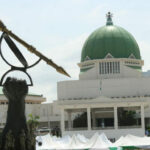By Sunday M. Ogwu, Fidelis Mac-Leva (Abuja), Abiodun Alade, Abdullateef Aliyu & Ayobami Balogun (Lagos)
Governors elected on the platform of the ruling All Progressives Congress (APC) have rejected the February 10 deadline set by the Central Bank of Nigeria (CBN) to end the legal tender status of the old N1000, N500 and N200 notes
Credible sources close to the governors said they were worried Nigerians have been finding it difficult to live a normal life in the last few days and therefore resolved to meet President Muhammadu Buhari on the matter.
The sources said the APC governors would tell the president most likely at 10am today that beyond whatever gains that would come with the naira swap, the wrong timing by the CBN is already hurting the economy, the wellbeing of the citizens and the security of the country.
Out of the 36 state governors in Nigeria, 21 of them are members of the ruling APC.
We are not afraid of anybody – El-Rufai dares ‘Villa cabals’
Kano: Gawuna, Bashir, Yusuf, Abacha lock horns at Daily Trust debate tomorrow
Before reaching the decision to meet the president, the governors had reportedly nominated Governors Babajide Sanwo-Olu (Lagos), Nasir El-Rufai (Kaduna), Mai Mala Buni (Yobe) and Dapo Abiodun (Ogun), who had met with CBN governor, Godwin Emefiele between January 30 and 31. During the meeting, they reportedly expressed their displeasure over the “hasty nature”, the cashless policy transition was being managed.
They also told Emefiele that while the old naira notes were being mopped up, it was evident the CBN could not make the new notes available to commercial banks as Nigerians struggle to access the money they legally deposited in commercial banks.
The governors were also said to have told Emefiele that it was evident the commercial banks did not have the needed technology to absolve the shock of increasing pressure of customers as evident in failed transactions using various internet platforms.
One of our sources said the governors told Emefiele to extend the transition period to between six months and one year so as to have a realistic cashless society.
“But Emefiele told them that there was actually no ill-feeling while taking the decision to change the naira notes; and that it was not his unilateral decision. He told them the president has to be in the picture,” the source said.
According to him, “All the APC governors are not happy because in the first instance, they were not consulted on the new naira policy and the timing and they felt that as a federating unit, states must be consulted before such a sensitive decision is taken.
“They told Emefiele that the anticipated gains of the policy have been deflated because Nigerians are angry; their economy is grounded and many of them have to pay money to access their monies.
“They told Emefiele that the approach is not in line with international best practices because the infrastructure that will support cashless policy is weak. There is no single state in the North for instance that all its LGAs have banks. There are similar challenges in some states in the South and that it is the informal sector that drives the economy and therefore, Nigerians require more time, knowledge and support to transit to a cashless society,” he said.
He said the four governors had briefed their colleagues and they collectively agreed to seek audience with President Buhari saying the meeting will take place any moment from now.
‘Military operations suffer as troops in bushes cash-strapped’
Another source said military operations in some hard-to-reach areas in parts of the country have been affected.
“You know that military operations, some of them being jointly executed with the police and civil defence are going in parts of the country.
“The commanders hold cash for some logistics operations and this is increasingly becoming difficult,” he said.
“Even though the troops receive their salaries through their bank accounts, they get their duty allowances in cash. Also, their commanders use cash to buy foodstuff and condiments the troops use to feed them and buy basic needs, especially in difficult terrains. This is seriously affecting their morale,” he said.
A unit commander in the Lake Chad region said the absence of the new naira notes is affecting them.
“There is no single bank in all the LGAs in northern Borno and even the GSM services are erratic, you cannot transfer money. Since the beginning of the operation against Boko Haram, most of the field logistics from both our high command and support from state governments are settled with cash. Some of these things are moving smoothly, there is the need for more time,” he said.
A civil defence official working around Birnin Gwari in Kaduna State concurred, saying their activities have been affected.
“We are conducting joint operations with the military and the police and our logistic support is by cash, the new naira notes are not there and even if they make a transfer to you, there are no banks here and PoS operatives have closed shop. This is a serious challenge,” he said.
CSOs protest in Lagos, accuse, banks of hoarding new notes
The Coalition of Civil Society Groups yesterday staged protests at the headquarters of some commercial banks in Lagos.
The protesters called on the CBN to sanction the Deposit Money Banks (DMBs), which they accused of hoarding the redesigned naira notes.
Some of the inscriptions on their placards were “Economic saboteurs are on the same level with terrorists,” “CBN sanctions banks now”, among others.
They also urged the Economic and Financial Crimes Commission and other related agencies to arrest and prosecute those hoarding the notes. While protesting at the headquarters of Wema Bank, Marina, they accused banks of sabotaging the cashless policy.
Low compliance to CBN’s directive for over-the-counter payment
Our correspondents observed low compliance to the CBN’s latest directive to banks to commence the payment of the redesigned naira notes over the counter with a maximum daily payout limit of N20, 000.
The CBN, in a statement yesterday by its Director of Corporate Communication, Osita Nwanisobi, said it observed, with grave concern, the activities of persons selling the newly redesigned banknotes and those flagrantly abusing the legal tender by hurling wads of naira notes in the air and stamping on the currency at social functions.
Nwanisobi said: “We have equally noticed the queues at Automated Teller Machines (ATMs) across the country and an upward trend in the cases of people stocking and aggregating the newly introduced banknotes they serially obtain from ATMs for reasons best known to them.
“Also worrisome are the reported cases of unregistered persons and non-bank officials swapping banknotes for members of the public, purportedly on behalf of the CBN.
“We wish to state unequivocally that, contrary to the practice of these unpatriotic persons, it is unlawful to sell the naira, hurl (spray), or stamp on the currency under any circumstance whatsoever.”
It said the CBN was collaborating with the Nigeria Police, Federal Inland Revenue Service, the Economic and Financial Crimes Commission and the Nigerian Financial Intelligence Unit to address “the unpatriotic practice.”
He warned Nigerians, particularly those at social functions such as birthdays, weddings and funerals, to desist from disrespecting the naira or risk being arrested by law enforcement agencies.
However, Daily Trust findings showed that commercial banks in the Ikeja axis of Lagos were not attending to customers.
While ATMs at the banks were not dispensing cash; bank officials said they only accepted deposits and transfers, insisting they were not taking withdrawals due to the shortage of cash.
In some commercial areas in Kano yesterday, there were long queues at the various ATM points up till around 8pm.
We’re being pushed to the wall-Transporters
Daily Trust observed yesterday that the transportation system in Lagos was hampered by the scarcity of the new naira notes as many motorists were stranded.
A student, identified himself as Adebayo, said he could not go out because there was no cash to pay transport fares.
Alhaji Yusuf Sanni, a transport union leader in Lagos, told our correspondent that transporters might be forced to take drastic action if the situation persists.
Sanni, who was the NURTW scribe around Seme Border, close to Benin Republic, said security agencies had stopped collecting old notes and prefer to be paid in CFA.
Banks merely complying with directive
Speaking on the allegation of hoarding the new naira note, the immediate past president of the Association of Senior Staff of Banks, Insurance and Financial Institutions (ASSBIFI), Oyinkan Olasanoye said: “The bank employees are not policymakers, whatever the policy makers dictate, we’ll carry out.”
She said, “With the unblocking of the over-the-counter payment, we should see some relief by next week.”
Speaking on the commercial banks preferring to give cash to high end customers, she said the CBN should demonstrate the political will to deal with the perpetrators.
Only masses are suffering
– Kwankwaso
“Big time politicians”, particularly, the presidential candidates, either have controlling shares in the banks or have friends who can help them mobilise whatever amount of money they need, presidential candidate of the New Nigeria Peoples Party (NNPP), Rabiu Kwankwaso, has said. Kwankwaso, who spoke on Channel’s Sunrise Daily Thursday, said the rich could not be affected by the policy because they own the banks.
“What the government is saying has to do with people who would want to take too much money, like leaders and politicians. They don’t know that many of our colleagues, those who are contesting, especially the presidential candidates, and by extension all those in their parties are owners of the banks.
“Not only that; people close to them have banks everywhere, so they will lose nothing. PDP has governors, and APC has governors. Governors by now would have collected so much money from the banks in their states.
“If their friends have got banks, I’m sure one or two of them may have banks or own large shares in some of these banks,” he said.
Accusing the CBN of punishing ordinary Nigerians with the naira redesign policy, he said: “Government should be in place to sort out issues for its people, not inflate unnecessary hardships.
“Some people in politics may for some strategic reasons be complaining but those complaining I believe are just a gimmick, I don’t believe that they mean it. We believe they don’t have issues. You see the people with real issues are the masses, businessmen, petty traders,” he said.

 Join Daily Trust WhatsApp Community For Quick Access To News and Happenings Around You.
Join Daily Trust WhatsApp Community For Quick Access To News and Happenings Around You.


